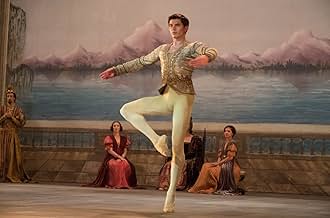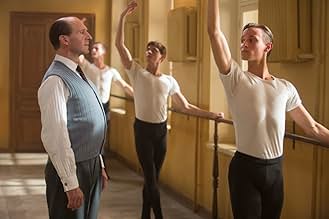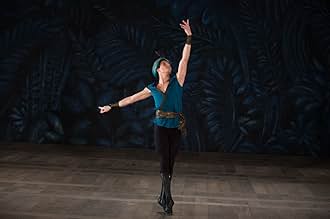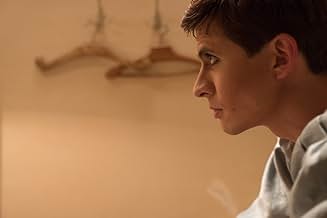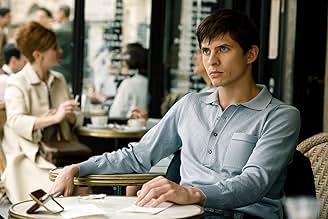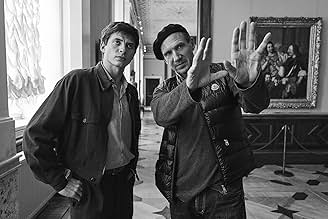VALUTAZIONE IMDb
6,6/10
7161
LA TUA VALUTAZIONE
La storia della fuga di Rudolf Nureyev in Occidente.La storia della fuga di Rudolf Nureyev in Occidente.La storia della fuga di Rudolf Nureyev in Occidente.
- Premi
- 1 vittoria e 4 candidature totali
Trama
Lo sapevi?
- QuizHayden Christensen, who trained extensively in ballet as a child, was first choice to star; however a persistent ankle injury prevented him from being able to perform to the standards demanded by Ralph Fiennes.
- BlooperIn a scene showing a close up of Nureyev's foot performing a tendu, the shoe he is wearing is a white split sole ballet slipper, a shoe that did not exist in the 1960s. Split sole ballet technique shoes have only been on the dance scene since the mid 1990s.
- Citazioni
Claire Motte: You are with the company? Did you dance tonight?
Rudolf Nureyev: If I had danced, you would remember.
- ConnessioniFeatured in Ralph Fiennes & Oleg Ivenko in Conversation (2019)
- Colonne sonoreLa Bayadère 3rd Shade Variation
Composed by Ludwig Minkus
Arranged by Matthias Gohl
Performed by Ilan Eshkeri and The London Metropolitan Orchestra
Recensione in evidenza
A 'white crow' in the Russian idiom is someone who stands out from others because of their appearance or behaviour. Rudolph Nureyev was, and for many still is, the white crow in the world of male ballet dancers. With extraordinary athleticism and sharply chiselled features, he defied gravity and glamorised male dancing. He also managed to make the KGB look flatfooted when he famously defected to the West.
We first see the young Rudolph as a six-year old child prodigy plucked from a poor background. The film flashes-back to these early scenes several times to remind viewers that despite his majestic aura on stage, he came from humble origins. The adult Rudolph (Oleg Ivenko) was a volatile personality both on and off stage. KGB spies watched elite dancers closely because ballet was a major cultural propaganda tool at the height of the Cold War. Rudolph was known to praise creative freedoms in the West and his secret sexuality was seen as a potential source of political embarrassment.
Most of the film builds the context in which Rudolph would commit what Russians believed was the ultimate act of treason. Barely enough camera time is devoted to his ballet lessons and performances, but what is shown will please devotees of the artform. A major sub-narrative is the live-in mentoring by his teacher Pushkin (Ralph Fiennes) and his relationships with Pushkin's wife Xenia (Chulpan Khamatova) and socialite Clara Saint (Adele Exarchopoulos). Rather than meaningful affairs, these relationships show Rudolph's willingness to exploit anyone who could advance his dancing career.
The film's modest tension curve spikes a few times during Rudolph's fiery temper tantrums, but it jumps steeply during the climactic defection scenes. The camera almost neurotically switches from close-ups on the faces of Russian spies, American observers, Rudolph and Clara, all while in the transit area of a French airport. When Rudolph is stopped from boarding a flight to his next performance, the KGB falsely tell him he has been summoned to a gala performance for the Kremlin. He is thrust into a vortex of disbelief, terror, and the realisation that if he seeks political asylum he will never set foot again in his homeland nor see his family.
Despite its uneven pace and meandering narrative arc, this powerful non-fiction storytelling is backed up with excellent acting performances and cinematography. The Cold War tensions are palpable and the political battle lines drawn clearly. You do not need to be a ballet fan to appreciate this film.
Director: Ralph Fiennes Stars: Oleg Ivenko, Ralph Fiennes, Adele Exarchopoulos, Chulpan Khamatova
We first see the young Rudolph as a six-year old child prodigy plucked from a poor background. The film flashes-back to these early scenes several times to remind viewers that despite his majestic aura on stage, he came from humble origins. The adult Rudolph (Oleg Ivenko) was a volatile personality both on and off stage. KGB spies watched elite dancers closely because ballet was a major cultural propaganda tool at the height of the Cold War. Rudolph was known to praise creative freedoms in the West and his secret sexuality was seen as a potential source of political embarrassment.
Most of the film builds the context in which Rudolph would commit what Russians believed was the ultimate act of treason. Barely enough camera time is devoted to his ballet lessons and performances, but what is shown will please devotees of the artform. A major sub-narrative is the live-in mentoring by his teacher Pushkin (Ralph Fiennes) and his relationships with Pushkin's wife Xenia (Chulpan Khamatova) and socialite Clara Saint (Adele Exarchopoulos). Rather than meaningful affairs, these relationships show Rudolph's willingness to exploit anyone who could advance his dancing career.
The film's modest tension curve spikes a few times during Rudolph's fiery temper tantrums, but it jumps steeply during the climactic defection scenes. The camera almost neurotically switches from close-ups on the faces of Russian spies, American observers, Rudolph and Clara, all while in the transit area of a French airport. When Rudolph is stopped from boarding a flight to his next performance, the KGB falsely tell him he has been summoned to a gala performance for the Kremlin. He is thrust into a vortex of disbelief, terror, and the realisation that if he seeks political asylum he will never set foot again in his homeland nor see his family.
Despite its uneven pace and meandering narrative arc, this powerful non-fiction storytelling is backed up with excellent acting performances and cinematography. The Cold War tensions are palpable and the political battle lines drawn clearly. You do not need to be a ballet fan to appreciate this film.
Director: Ralph Fiennes Stars: Oleg Ivenko, Ralph Fiennes, Adele Exarchopoulos, Chulpan Khamatova
- CineMuseFilms
- 1 set 2019
- Permalink
I più visti
Accedi per valutare e creare un elenco di titoli salvati per ottenere consigli personalizzati
Dettagli
- Data di uscita
- Paesi di origine
- Siti ufficiali
- Lingue
- Celebre anche come
- The White Crow
- Luoghi delle riprese
- Aziende produttrici
- Vedi altri crediti dell’azienda su IMDbPro
Botteghino
- Lordo Stati Uniti e Canada
- 1.828.784 USD
- Fine settimana di apertura Stati Uniti e Canada
- 78.782 USD
- 28 apr 2019
- Lordo in tutto il mondo
- 7.622.595 USD
- Tempo di esecuzione2 ore 7 minuti
- Colore
- Proporzioni
- 1.85 : 1
Contribuisci a questa pagina
Suggerisci una modifica o aggiungi i contenuti mancanti

Divario superiore
By what name was Nureyev - The White Crow (2018) officially released in India in English?
Rispondi





